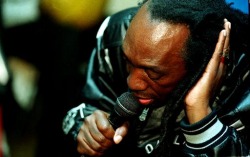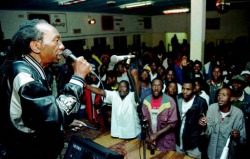Zimbabwe: Music

Melissa Murrin
Hjelmgren 123
Period 1 5.19.0
In many countries music is a very important, it can bring people to together. In third war countries like Zimbabwe, they do not have television or public speakers or anything to teach them what is going on and what to do. In Zimbabwe there was a radio station called Zimwaves Radio (Zimwaves), which aired illegal protest music. Thomas Mapfumo was a man that helped Zimbabwe become independent with his music by inspiring others. The music that was playing on the radio and that Mapfumo was playing was banned which caused many problems. The music they played in Zimbabwe unified the people and even thought it was illegal to play, they did anyway and that was the best thing to do.
Zimwave was a fantastic idea, a radio from Zimbabwe for Zimbabwe. Crisis soaked Zimbabwe by an over powering government. The country was in desperate need of independence, but with the government, they had no way to communicate to one another. Then Michael Masanga (Michael Masanga) had an idea of a radio that broadcasted news, and current events, and gatherings, everything they need to unite Zimbabwe. He succeeded, once he put the word out to the public there were a lot of people that wanted to tell their opinions about the government, and what people could do to protest. All of the music that they played was protest music. The station inspires Zimbabweans to be involved in the shaping of their country. With many people increasingly relying on the Internet for information, the use of Internet radio keeps growing and it is good to note that some citizens of undemocratic countries are revolutionizing the Internet for worthy causes. Overall the entire radio station was illegal. They broadcasted from a truck in order to move around a lot. Once the government found where the signal was coming from they had to move. Newspapers kept on telling how the protest music continued on (Newspaper). Although what they were doing was illegal, it was worth it because the people of Zimbabwe started to come together, and fight for what they deserved, their independence.
The man most famous for spreading music was Thomas Mapfumo (Thomas Mapfumo), he inspired hundreds of people to come together and fight, not physically, but with the sound of their voice. He played protest music day and night, encouraging people to stand up to the government. `Mapfumo's music provided the fuel and yearning for liberation,' says Tafazuwa, a student who fled Zimbabwe and moved to Britain. `He is a true culture bandit.‘ The Rhodesian Government thought so too, and duly imprisoned him. Recognizing the influence he had on people, the white Government tried to manipulate Mapfumo into speaking in their favor. He resisted and the government was eventually overthrown in 1980. The newly elected president Robert Mugabe honored Mapfumo on stage with Bob Marley, who made a special visit to perform his song `Zimbabwe' for the occasion. Mapfumo and his band The Blacks Unlimited headlined the show. Mapfumo recalls: `well, we all felt great... because everyone was celebrating a new era. Everyone was very happy. It was a day to remember.' A short while after there was something else for Mapfumo to sing about. AIDS, poverty, and corruption hit Zimbabwe. Again with Mapfumo’s singing he inspired people to help each other. Fortunately this time he was not alone and people like Viomak (Viomak), and others supported him. By coming together and fighting the government Zimbabwe became a more powerful country.
In the end, following the rules is something we have been taught since we were little. But in this one exception, not following the rules was what gave them freedom. They fought for what they believed in and succeeded, by coming together. Songs by people like Mapfumo and Viomak helped the country come together, and their songs gave Zimbabwe independence.
Chigege, Harriet. “Zimwaves Scores Another Penalty For Zimbabwe Protest Music.” PRLog Free Press Release. 22 March 2009 <http://www.prlog.org/10203115-zimwaves-scores-another-penalty-for-zimbabwe-protest-music.html>
Ma'anit, Adam. "ZIMBABWE; Culture bandit." New Internationalist. 31 Aug 2003. p 24. eLibrary. Proquest CSA. NEW TRIER TOWNSHIP HIGH SCHOOL. 21 May 2009. <http://elibrary.bigchalk.com>.
“Mapfumo, Thomas." Britannica Book of the Year, 1994. 2009. Encyclopædia Britannica Online. 21 May 2009 <http://search.eb.com/eb/article-9115248>.
Chu/Harare, Jeff. "Singing The Walls Down Protest music may be dead in the West, but it's alive and well in Zimbabwe, where the oppressed and the impoverished find hope and strength in the songs of Thomas Mapfumo and Ol." Time International. 03 Mar 2003. 46+. eLibrary. Proquest CSA. NEW TRIER TOWNSHIP HIGH SCHOOL. 21 May 2009. <http://elibrary.bigchalk.com>.
Chigege, Harriet. “Censored musician launches online 'protest radio'.” Freemuse freedom of musical expression. 26 May 2008. <http://www.freemuse.org/sw27960.asp>
Chigege, Harriet. “Protest singer Viomak unleashes ‘Zimbabwe is Mine’ in song as Chinhoyi is cursed” PRLog Free Press Release. 21 March 2009. <http://www.prlog.org/10202982-protest-singer-viomak-unleashes-zimbabwe-is-mine-in-song-as-chinhoyi-is-cursed.html>
Last updated by Melissa Murrin 21 May 2009
Hjelmgren 123
Period 1 5.19.0
In many countries music is a very important, it can bring people to together. In third war countries like Zimbabwe, they do not have television or public speakers or anything to teach them what is going on and what to do. In Zimbabwe there was a radio station called Zimwaves Radio (Zimwaves), which aired illegal protest music. Thomas Mapfumo was a man that helped Zimbabwe become independent with his music by inspiring others. The music that was playing on the radio and that Mapfumo was playing was banned which caused many problems. The music they played in Zimbabwe unified the people and even thought it was illegal to play, they did anyway and that was the best thing to do.
Zimwave was a fantastic idea, a radio from Zimbabwe for Zimbabwe. Crisis soaked Zimbabwe by an over powering government. The country was in desperate need of independence, but with the government, they had no way to communicate to one another. Then Michael Masanga (Michael Masanga) had an idea of a radio that broadcasted news, and current events, and gatherings, everything they need to unite Zimbabwe. He succeeded, once he put the word out to the public there were a lot of people that wanted to tell their opinions about the government, and what people could do to protest. All of the music that they played was protest music. The station inspires Zimbabweans to be involved in the shaping of their country. With many people increasingly relying on the Internet for information, the use of Internet radio keeps growing and it is good to note that some citizens of undemocratic countries are revolutionizing the Internet for worthy causes. Overall the entire radio station was illegal. They broadcasted from a truck in order to move around a lot. Once the government found where the signal was coming from they had to move. Newspapers kept on telling how the protest music continued on (Newspaper). Although what they were doing was illegal, it was worth it because the people of Zimbabwe started to come together, and fight for what they deserved, their independence.
The man most famous for spreading music was Thomas Mapfumo (Thomas Mapfumo), he inspired hundreds of people to come together and fight, not physically, but with the sound of their voice. He played protest music day and night, encouraging people to stand up to the government. `Mapfumo's music provided the fuel and yearning for liberation,' says Tafazuwa, a student who fled Zimbabwe and moved to Britain. `He is a true culture bandit.‘ The Rhodesian Government thought so too, and duly imprisoned him. Recognizing the influence he had on people, the white Government tried to manipulate Mapfumo into speaking in their favor. He resisted and the government was eventually overthrown in 1980. The newly elected president Robert Mugabe honored Mapfumo on stage with Bob Marley, who made a special visit to perform his song `Zimbabwe' for the occasion. Mapfumo and his band The Blacks Unlimited headlined the show. Mapfumo recalls: `well, we all felt great... because everyone was celebrating a new era. Everyone was very happy. It was a day to remember.' A short while after there was something else for Mapfumo to sing about. AIDS, poverty, and corruption hit Zimbabwe. Again with Mapfumo’s singing he inspired people to help each other. Fortunately this time he was not alone and people like Viomak (Viomak), and others supported him. By coming together and fighting the government Zimbabwe became a more powerful country.
In the end, following the rules is something we have been taught since we were little. But in this one exception, not following the rules was what gave them freedom. They fought for what they believed in and succeeded, by coming together. Songs by people like Mapfumo and Viomak helped the country come together, and their songs gave Zimbabwe independence.
Chigege, Harriet. “Zimwaves Scores Another Penalty For Zimbabwe Protest Music.” PRLog Free Press Release. 22 March 2009 <http://www.prlog.org/10203115-zimwaves-scores-another-penalty-for-zimbabwe-protest-music.html>
Ma'anit, Adam. "ZIMBABWE; Culture bandit." New Internationalist. 31 Aug 2003. p 24. eLibrary. Proquest CSA. NEW TRIER TOWNSHIP HIGH SCHOOL. 21 May 2009. <http://elibrary.bigchalk.com>.
“Mapfumo, Thomas." Britannica Book of the Year, 1994. 2009. Encyclopædia Britannica Online. 21 May 2009 <http://search.eb.com/eb/article-9115248>.
Chu/Harare, Jeff. "Singing The Walls Down Protest music may be dead in the West, but it's alive and well in Zimbabwe, where the oppressed and the impoverished find hope and strength in the songs of Thomas Mapfumo and Ol." Time International. 03 Mar 2003. 46+. eLibrary. Proquest CSA. NEW TRIER TOWNSHIP HIGH SCHOOL. 21 May 2009. <http://elibrary.bigchalk.com>.
Chigege, Harriet. “Censored musician launches online 'protest radio'.” Freemuse freedom of musical expression. 26 May 2008. <http://www.freemuse.org/sw27960.asp>
Chigege, Harriet. “Protest singer Viomak unleashes ‘Zimbabwe is Mine’ in song as Chinhoyi is cursed” PRLog Free Press Release. 21 March 2009. <http://www.prlog.org/10202982-protest-singer-viomak-unleashes-zimbabwe-is-mine-in-song-as-chinhoyi-is-cursed.html>
Last updated by Melissa Murrin 21 May 2009

